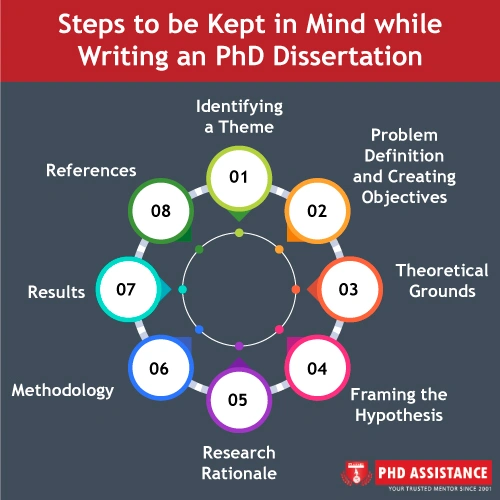Writing an Outstanding Final-Year PhD Dissertation
In-brief
- You will find the best Dissertation Research Areas / Topics for future researchers enrolled in Engineering/management.
- In order to identify the future research topics, we have reviewed the Engineering literature (recent peer-reviewed studies) on the security and privacy issues in the network environment for efficient network provisioning.
- The key challenge that you might be confronted with while undertaking a PhD dissertation would be the problem you intend to resolve through your research.
Introduction
A dissertation is something that is a part and parcel of your PhD course which would eventually pave the way for assessment of a course of higher education. The dissertation is aimed at commencing and involving a scholar in the domain of academic research. The purpose of including a dissertation is to encourage and instil a sense of curiosity within PhD scholar that forms the crux for knowledge development. Through this article, a guide to writing an excellent dissertation is presented.
Steps to be Kept in Mind while Writing an PhD Dissertation
Identifying a Theme
A theme in this case would pertain to the topic that will be investigated through the research. It is selected on the basis of your (scholar’s) lived experience or knowledge derived from books. In order to select an appropriate theme for a research, it would be helpful if you make a note of what is it that you intend to achieve through the research. Nonetheless, it would make sense to indicate that you need to delimit your research prior to getting your hands dirty on the field and thus eliminating the scope of getting stranded mid-way.
Problem Definition and Creating Objectives
The key challenge that you might be confronted with while undertaking a PhD dissertation would be the problem you intend to resolve through your research. Following the topic being selected, it is time for defining the problem in research. Defining the problem of research will be instrumental in justifying why there is a need to conduct this research. Once the research problem has been defined, you set forth to outline the research objectives. The research objectives forms the crux, it makes up the central axis on which the research pivots. But please note that it is not the subject, but what in a usually vast domain attracts the attention of a researcher. In case you decide to proceed further with your dissertation without first outlining the research objectives, it will lead to confusion and ultimately be a waste of time.
Theoretical Grounds
The theoretical ground is the basic component that lends support to any scientific research. A theoretical framework enables the researcher to situate their concerns or challenges in the scope of the area of knowledge where it has been added. The component of Theoretical Framework with in Academic Research would comprise of a review of articles, texts, books and every other pertinent material within the subject or domain being investigated.
Framing the Hypothesis
Research hypotheses are nothing but statements that attempt to provide answers to the problem of research. Such ideas would come to the fore right at the beginning or during the course of the investigative procedures on the basis of the knowledge that the scholar has on the subject. Any hypothesis that is good would be one that can be challenged, which means one that can be confronted with actual data.

Research Rationale
The rationale for the research would present the reader with a rational justification as to why this research is being carried out. The justification comprises of four key rules; a) why a theme was selected? b) what is the purpose of the research? c) who would be the target audience for the research? and d) the base (source of information where you work is based). For your PhD dissertation, you need to write around 200 to 250 words to justify your rationale. This provides a valid and believable argument for your research. However, the argument needs to be logical, clear and direct as it is worth deciding the continuity within your research idea.
Methodology
The methodology adopted for research will describe your research process, that is, the manner in which you intend to conduct your research. In order to present the methodology adopted for research, you should take into account the kind of research – the manner of research, which means; you need to outline whether your research will be descriptive, explanatory or exploratory. The Research Methodology is what will guide your research to reach the intended destination. The choice of methodology would depend upon the objectives that you have framed and what you intend to achieve through the research.
Results
The results are essentially the findings that you derive while conducting the research. The tools for extracting results would depend on the methodology. For instance, if your study utilizes a Qualitative Methodology, you would depend on a thematic analysis to arrive at results. In contrast, if your study involves a quantitative methodology, statistical tools would be used to derive results.
References
There are several referencing and formatting styles that are available and the choice of referencing and formatting style would depend upon your educational institution. Each institution follows a fixed style. The most common style of referencing and formatting is Harvard which is in practice across a large number of educational institution.
Conclusion
These are some of the components that need to be kept in mind when writing a PhD dissertation. Though we have not covered literature review in this, which does not mean that Literature Review is not important. However, the way you frame your objectives, methodology and define the problem statement within your research is what would ensure that you achieve the aim with which you are conducting this research.



